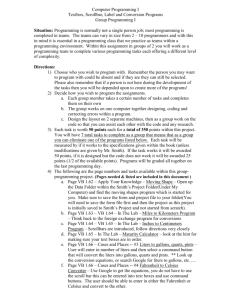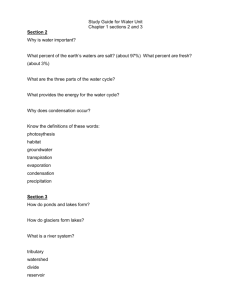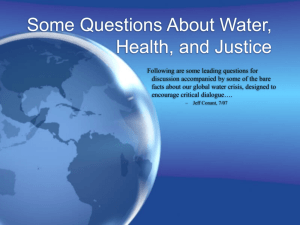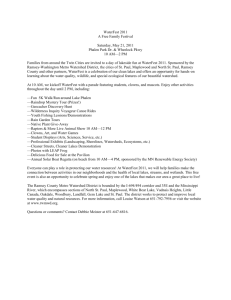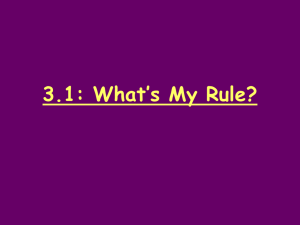NR1 - water
advertisement
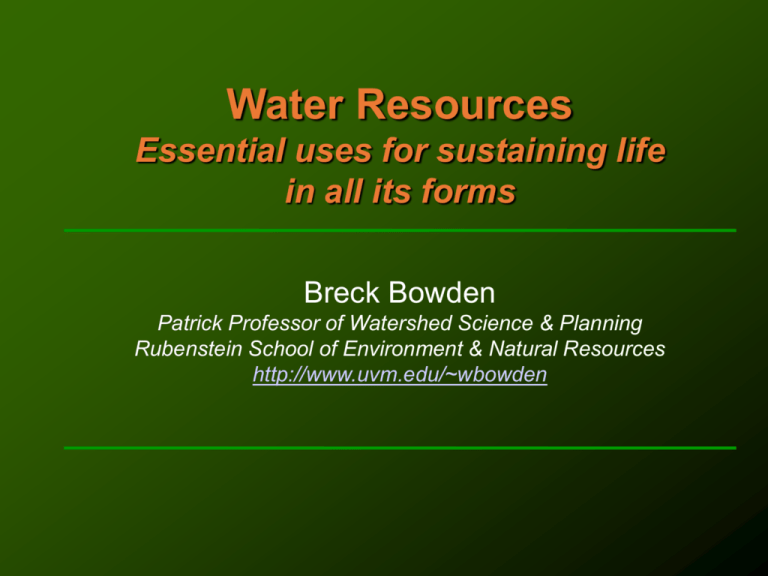
Water Resources Essential uses for sustaining life in all its forms Breck Bowden Patrick Professor of Watershed Science & Planning Rubenstein School of Environment & Natural Resources http://www.uvm.edu/~wbowden Take Home Messages • Water is a wonderfully strange compound. • We use a lot of water, often without knowing it. • Water management is an issue of critical importance: the Stormwater example. • Why use a ‘watershed’ approach? Unusual characteristics of water • Why is it possible to skate on ice? [key concept: phases] • Why don’t lakes freeze from the bottom? [key concept: density] To Water Use To Water Quality The ‘phases’ of water Pressure (atmospheres) 10,000 • Sea level 1,000 • Denver 100 10 Liquid Solid 1 .01 Vapor .001 .0001 -20 0 20 40 60 80 Temperature (degrees Celsius) 100 120 The ‘phases’ of water Pressure (atmospheres) 10,000 • Sea level 1,000 Glaciers 100 • Denver Hockey player 10 Dull skates Solid Liquid • Gutterson Field House 1 .01 Vapor .001 .0001 -20 0 20 40 60 80 100 120 Temperature (degrees Celsius) • • • • 1 atmosphere = ~14.7 lbs per square inch 1 hockey player weighs about 190 lbs 1 hockey blade is about 10” long and <0.01” wide = <0.1 square inches applied pressure is 190 lbs/0.1 in2 = 1900 psi = ~130 atms The ‘phases’ of water Pressure (atmospheres) 10,000 • Sea level 1,000 • Denver 100 10 Liquid Solid • Gutterson Field House 1 • Most other substances .01 Vapor .001 .0001 -20 0 20 40 60 80 100 120 Temperature (degrees Celsius) Return to Characteristics Continue Why do some objects float? • Mass is not the same thing as weight • Density = mass/volume (g/cm3) > = < = Why don’t lakes freeze from the bottom up? 15oC 10oC Why don’t lakes freeze from the bottom up? 12oC 10oC Why don’t lakes freeze from the bottom up? 10oC 10oC Why don’t lakes freeze from the bottom up? 3.97oC 10oC Why don’t lakes freeze from the bottom up? 3.97oC 3.97oC Why don’t lakes freeze from the bottom up? 1oC 3.97oC Why don’t lakes freeze from the bottom up? 0oC 3.97oC The basic structure of water Density changes with phase Free molecules in liquid Fixed molecules in solid Return to Characteristics Continue We often ‘use’ water without realizing it 1 automobile 400,000 liters (106,000 gallons) 1 kilogram cotton 10,500 liters (2,400 gallons) 1 kilogram aluminum 9,000 liters (2,800 gallons) 1 kilogram grain-fed beef 7,000 liters (1,900 gallons) 1 kilogram rice 1 kilogram corn 1 kilogram paper 1 kilogram steel 5,000 liters (1,300 gallons) 1,500 liters (400 gallons) 880 liters (230 gallons) 220 liters (60 gallons) Miller (2004) Fig. 13.6, p. 298 Typical Water Use in the Home How much water do you use? Water Use Trends in the US In Vermont: 187 gal/person/day (USGS data) Water Use World Wide Assessment & Forecast UNESCO (2000) We use more water than most Environment Canada (http://www.ec.gc.ca/water/e_main.html) What is the incentive to conserve? Environment Canada (http://www.ec.gc.ca/water/e_main.html) We pay less for water than almost anyone else Environment Canada (http://www.ec.gc.ca/water/e_main.html) Where do we get the water we use? USGS Water Science Web Site Where does all the water go? Discharge of untreated municipal sewage (nitrates and phosphates) Nitrogen compounds produced by cars and factories Discharge of detergents ( phosphates) Discharge of treated municipal sewage (primary and secondary treatment: nitrates and phosphates) Lake ecosystem nutrient overload and breakdown of chemical cycling Dissolving of nitrogen oxides (from internal combustion engines and furnaces) Stormwater Natural runoff (nitrates and phosphates Manure runoff From feedlots (nitrates and Phosphates, ammonia) Runoff from streets, lawns, and construction lots (nitrates and phosphates) Runoff and erosion (from from cultivation, mining, construction, and poor land use) Miller (2004) Fig. 19.5, p. 482 Take Home Messages • Water is a wonderfully strange compound. • We use a lot of water, often without knowing it. • Water management is an issue of critical importance: the Stormwater example. • Why use a ‘watershed’ approach? Useful Websites • USGS’s Water Science Web Site http://wwwga.usgs.gov/edu/mwater.html • EPA’s Surf Your Watershed http://cfpub.epa.gov/surf/locate/index.cfm • EPA’s Watershed Academy http://www.epa.gov/owow/watershed/wacademy/ • Lake Champlain Basin Program (Atlas) http://www.lcbp.org/ Thank you!
